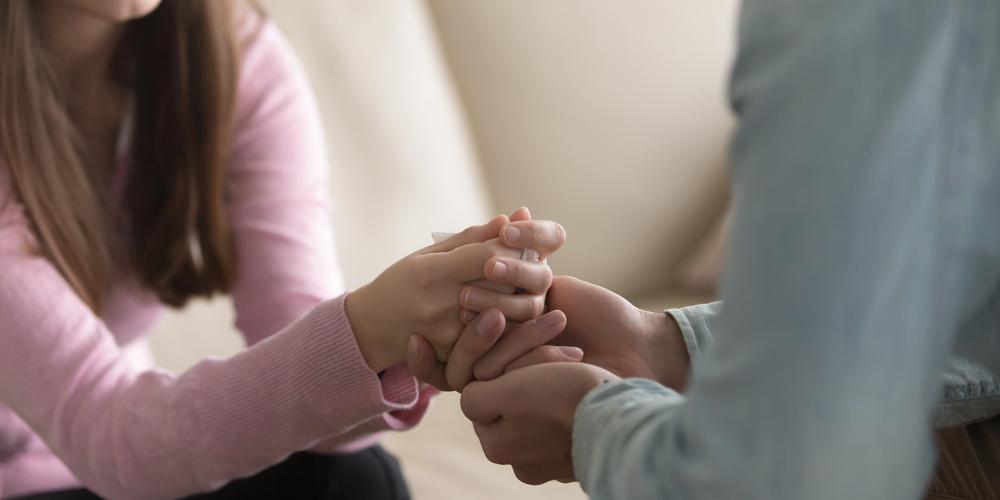
Aline Antoine is a nurse at VUB Dilemma, the only Dutch-speaking university abortion centre in Belgium. She does it primarily out of social engagement. This is also evident in her second half-time job, in the Wellbeing team of People&Organisation.
One in four pregnancies is unplanned. Is there enough knowledge about contraception?
Aline: “Just because a pregnancy is unplanned doesn’t mean it can’t be wanted. A woman is fertile for an average of 35 years. So it takes a lot of effort and also a bit of luck to never have an unplanned pregnancy during her lifetime. Apart from that, no contraception offers 100% security, so unplanned pregnancies can never be fully avoided. Women often wrongly feel guilty about this, as if they have failed. It is true that certain groups lack knowledge about it, but the biggest problem is mainly access to contraception. Just think of people who are struggling financially, refugees, people who don’t have health insurance, people who don’t speak the language...”
Are there taboos around abortion?
“Abortion is not exceptional: in Belgium, one in five women undergoes an abortion in the course of her life. Research shows that an abortion has no impact on a woman’s mental wellbeing; a small minority have problems afterwards with moving on from the experience. The most reliable predictor of mental health after an abortion is mental health before the abortion. Having said that, abortion is not an easy choice for anyone, no one enjoys having to choose and undergo this. That is why you have to allow emotions, including grief: abortion also involves grieving. Good care, good support and a good social network are very important.”
“The biggest problem is mainly access to contraception.”
“It’s also not only a women’s issue. Men have a role in abortion: they regularly come to the consultation and support their partner during the procedure. Besides, you need two people to get pregnant. Sometimes we get the response from a partner: ‘she forgot her pill again’. Then I kindly turn to the man and tell him that if ‘she’ didn’t want to be pregnant, you should wear a condom. Then they go quiet. Some women also go through this on their own. Then we always ask about her social network, her parents and friends. We ask if there is anyone she can turn to, if there are people around her who can support her.”
How progressive is our abortion law?
“Since the 1990 abortion law, little progress has been made in the fight to be in charge of one’s own womb. The 2018 victory, in which abortion was largely removed from criminal law after all these years, making it an acquired right rather than a tolerated crime, is rather of symbolic importance. In fact, substantively, little changed. It can and should be more progressive. I’m talking about scrapping or shortening the six-day waiting period and extending the legal term to 12 weeks. Around this topic, we can certainly count on support within VUB.”
On the day of the interview, the scientific committee appointed by the federal parliament to evaluate Belgian legislation suggests extending the term to at least 18 weeks, if the woman requests it. The committee also further recommends removing the six-day statutory waiting period from the law, as well as mandatory information about the possibility of adoption or other care options. Mandatory information on contraception should be retained. The scientific committee was formed by the country’s seven universities that train doctors.
One of Dilemma’s doctors, Dr Anne Verougstraete, participated.
Is it a tough job?
“I think working in paediatric oncology is tougher. I once dreamed of becoming a paediatric nurse. But during my internship in paediatrics, I came home crying every day, so my parents asked if I wanted to do this for the rest of my life. That’s when I decided to become a social nurse. This job gives a lot of often quick satisfaction. The full pathway is completed in a fortnight and the women are grateful and relieved afterwards.”
Aline has also been working half-time within the Wellbeing team of the P&O department since May 2020. What does this job involve?
“We guide and support VUB staff with general questions related to wellbeing at work. I deal with intake interviews on the mental wellbeing of staff members. These cover stress, workload, exhaustion, mental strain, among other things, and in some cases this may include a referral to BRUCC [centre for psychological counselling]. But my job goes beyond that. There are consultations with managers who are concerned about a colleague’s wellbeing and I follow up with colleagues who are absent for long periods. I don’t ask “when will you come back to work?” but rather “how are you doing?” and “how can we help you?”, which is an important nuance. I advise and support absent colleagues in their gradual return to work. I also participate in projects such as “the working method regarding reintegration and absence”.
Do you have questions regarding abortion or well-being?
Dilemma : Abortion Brussels | Vrije Universiteit Brussel (vub.be)